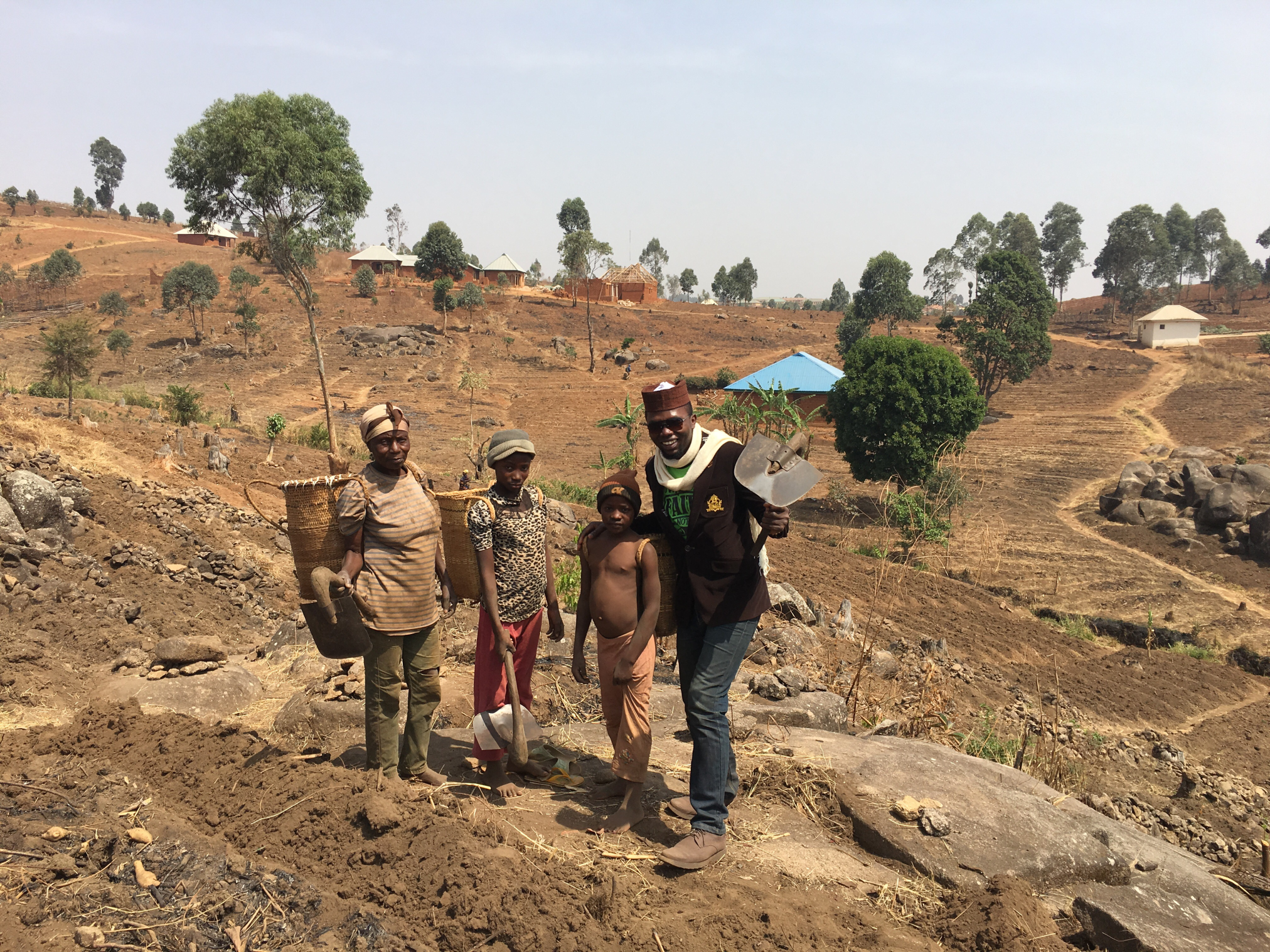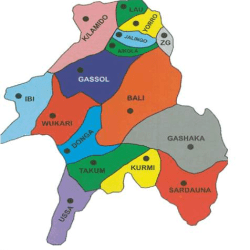Taraba State comprises 16 Local Government Areas (LGAs), namely:
Ardo Kola
Ardo Kola is a Local Government Area in Taraba State, Nigeria. Its headquarters are in the town of Sunkani.
It has an area of 2,262 km².
Bali
Bali is a Local Government Area in Taraba State, Nigeria.
Its headquarters are in the town of Bali.
It has an area of 9,146 km².
Donga
Donga is a Local Government Area in Taraba State, Nigeria. Its headquarters are in the town of Donga on the Donga River at7°43′00″N 10°03′00″E.
It has an area of 3,121 km².
Gashaka
Gashaka is a Local Government Area in Taraba State, Nigeria. Its headquarters are in the town of Serti.
It has an area of 8,393 km².
Gassol
Gassol is a Local Government Area in Taraba State, Nigeria. Its headquarters are in the town of Mutum Biyu (or Mutumbiyu or Mutum Mbiyu) on the A4 highway at8°38′00″N 10°46′00″E.
It has an area of 5,548 km².
The northern border of Gassol is the Benue River and the Taraba River flows north through the area to its confluence with the Benue.
Gassol is one of the eight LGAs of Taraba State whose majority population is the Mumuye people.
Ibi
Ibi is a town and administrative district in Taraba State, Nigeria. The town is located on the south bank of the Benue River, opposite the influx of the much smaller Shemankar River. Both the Taraba River and the Donga River flow into the Benue within the LGA.
Ibi is one of the sixteen local government areas of Taraba State, and is governed by an elected chairman.
Ibi was located where the traditional land trade route of eastern Igboland crossed the river trade route of the Benue River. It was part of the Jukon kingdom (1720-1815) whose capital, Kororofa, was 35 miles east (up river).
After the Fulani invasion Ibi became part of the Muri Emirate (1817-1892). Like the rest of Muri it was under the French governor Louis Mizon from 1892-1893.
By 1899 the Niger Company established a trading station at Ibi, and by 1901 telegraph service to Lokoja had been established.
The British took control in 1900 and established Ibi as the administrative headquarters of western Muri. As cotton was one of the major crops of the area, steam powered cotton gins were established in Ibi in the early 1920s.
The Nwonyo fishing festival is one of the major festivities in the area.
Jalingo
Jalingo is a city in north-eastern Nigeria. It is the capital city of Taraba State and has an estimated population of 118,000.
Karim Lamido
Karim Lamido is a Local Government Area in Taraba State, Nigeria. Its headquarters are in the town of Karim Lamido at9°18′00″N 11°12′00″E.
It has an area of 6,620 km².
The southern border of Karin Lamido is the Benue River and it is traversed by several tributaries of that river.
Kurmi
Kurmi is a Local Government Area in Taraba State, Nigeria. Its headquarters are in the town of Ba’Issa.
It has an area of 4,353 km².
Lau
Lau is a Local Government Area in Taraba State, Nigeria. Its headquarters are in the town of Lau.
It has an area of 1,660 km².
Sardauna
Sardauna Local Government Area is located in the extreme southeast of Taraba State in Nigeria. It sits atop the Mambilla Plateau, which is dotted by other towns such as Maisamari and Nguroje.
The capital of the LGA is Gembu, which is the principal town of various ethnic groups, such as Mambilla, Chamba, Etc.
Other ethnic groups from the mainstream Nigeria and the bordering Cameroon republic such as Hausa and Kanuri also live there.
In contrast to the rather steamy and humid climate of most other parts of southeastern Nigeria, the climate in this part of the country (owing to its altitude) is relatively cool; most days in the dry season the temperature will reach 20-23 C and drop to 16-18 C at night, whilst in the wet season these averages fall a couple of degrees.
Takum
Takum is a Local Government Area in Taraba State, Nigeria. Its headquarters are in the town of Takum at7°16′00″N 9°59′00″E. Takum borders the Republic of Cameroon in the south.
It has an area of 2,503 km².
Ussa
Ussa is a Local Government Area in Taraba State, Nigeria. Its headquarters are in the town of Lissam at7°11′00″N 10°02′00″E. Ussa borders the Republic of Cameroon in the south; the Donga River forms its northern boundary.
It has an area of 1,495 km².
Kuteb people are located in large population.
Wukari
Wukari is a Local Government Area in Taraba State, Nigeria.
Its headquarters are in the town of Wukari on the A4 highway.
The Donga River flows through the area and the Benue River forms a boundary with Nasarawa State to the northwest. The town is the base of the Wukari Federation, a traditional state.
It has an area of 4,308 km².
Yorro
Yorro is a Local Government Area in Taraba State, Nigeria.
Its headquarters are in the town of Yorro.
It has an area of 1,275 km².
Zing
Zing is a Local Government Area in Taraba State, Nigeria.
Its headquarters are in the town of Zing.
It has an area of 1,030 km².
Over 90% of the people in Zing are Mumuye with twelve [12] clans.
Taraba
Taraba is a State in Nigeria. The capital city is Jalingo,
The State was established in 1991.
It is located in North Eastern Nigeria.
Taraba State was carved out of the former Gongola State and was named after the Taraba river.

Taraba is surrounded by the states of Bauchi and Gombe to the north; Adamawa to the east; Cameroon to the south; and Benue, Nassarawa, and Plateau to the west.

The Mumuye, Jukun, Chamba, Tiv, Kuteb, and Ichen tribes make up the majority of the population, and they are concentrated in the southern portion of the state. The Wurkum, Mumuye, and Kona tribes are concentrated in the northern section of the state.

Taraba State has sixteen (16) local government areas, which include Ardo Kola, Bali, Donga, Gashaka, Gassol, Ibi, Jalingo, Karim Lamido, Kurmi, Lau, Sardauna, Takum, etc.

Also in the state, there are different tribes that are under these local governments, and they include Fulfulde, Kona, Mumuye, Etkywan; Fam; Gbaya, Jukun, Kam, Dza, Tiv, and Fulfulde, among others.

The state has some modern roads running north to Yola, west to Bauchi town, and south to Makurdi town, while the Benue River allows for river transport.

Taraba is located in northern Nigeria and it is surrounded by mountains; the popular one is the Mambilla Plateau.

In the 1980s developed a game reserve named Gashaka/Gumti National Park.
Taraba State was created from Gongola State. This was done during the military administration of General Ibrahim Babangida on August 27, 1991.
During the creation of the state, which was named after Taraba river, there was the need to establish the capital city for it, and then Jalingo was named.
There are over 40 different tribes in the state, speaking the Taraba State language.
The Mumuye, Jukun and Mambilla peoples, among whom there are sizable numbers of Christians, make up the majority of the population of Taraba state.
Prominent tourists areas include Mambilla Tourist Center, Gumpti Park, and the game reserve in Gashaka.
the Nwunyu Fishing Festival in Ibi, which typically takes place in April each year and features events like canoe racing, swimming competitions, and cultural dances, have all seen improvements thanks to the government’s concerted efforts.
There are numerous festivals celebrated by the people of Taraba State, such as the Purma of the Chamba in Donga, the Takum and Jibu culture dance in Bali, the Tagba of the Acha People in Takum, the Kuchecheb of the Kutebs in Takum and Ussa, the Kati of the Mambilla, and many more.
Meanwhile, since Taraba is wealthy and home to numerous ethnic groups, including Fulanis, Kuteb Chamba, Yandang, Mumuyes, Mambila, Wurkums, Janjo, Jukun, Ichen, Tiv, Kaka, Pena, Kambu, kodei, Wawa, Vute, Hausa, and Ndola, it is referred to as “Nature’s gift to the nation.”
The major occupation of the Taraba people is agriculture. Although at the time it was created, the farmers indulged in subsistence farming, now, the farmers are commercially inclined. Thus, farmers in the state cultivate corn, sorghum, millet, rice, yams, sugarcane, and cassava (manioc) (maize). Additionally, river fishing and the herding of cattle, goats, and sheep are significant in Taraba State.
Furthermore, rubber and oil palm trees have been planted in the state’s southwest, while in the far south, the Mambilla Mountain area of the Adamawa Plateau offers a tsetse-free grassy highland that is ideally suited for cattle grazing.
On a similar scale, people also produce livestock in various ways, such as raising chickens, breeding rabbits, and raising pigs. Communities that live along the banks of the rivers Benue, Taraba, Donga, and Ibi fish all year long. Other occupations, including blacksmithing, carving, needlework, mat-making, ceramics, cloth-weaving, dyeing, and cloth-weaving are also practiced throughout the state.



